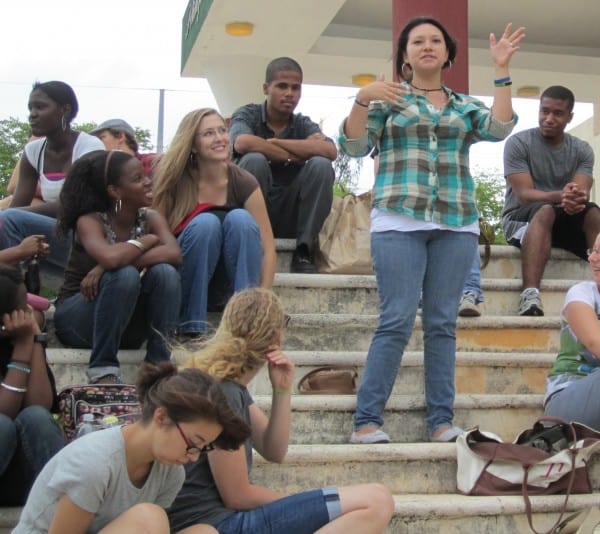At the beginning of a summer mission project we always have a briefing where we talk about cultural differences and crossing cultural boundaries. I love leading this segment, because crossing cultural boundaries has taught me personally a lot about myself and my own culture.
I was all prepared to lead this segment with our team–Bible verses studied, witty illustrations rehearsed, notes in hand–but I was not prepared for the direction the conversation would take. I was not prepared to see a picture of Jesus himself revealed in these new teammates of mine. We started by reading I Corinthians 9:19-23, where Paul describes how he lays aside his culture for the sake of the Gospel:
“Though I am free and belong to no one, I have made myself a slave to everyone, to win as many as possible. To the Jews I became like a Jew, to win the Jews. To those under the law I became like one under the law (though I myself am not under the law), so as to win those under the law. To those not having the law I became like one not having the law (though I am not free from God’s law but am under Christ’s law), so as to win those not having the law. To the weak I became weak, to win the weak. I have become all things to all people so that by all possible means I might save some. I do all this for the sake of the gospel, that I may share in its blessings.”
I asked, “How do you think Paul felt when he was ‘becoming like’ these different groups of people?” Silence.
Finally, one student offered, “Well, I know how it makes me feel to change the way I am to fit in better.” He lived in Mexico until he was nine years old, then moved to Houston, where he lived in a largely African-American neighborhood. He explained how he learned quickly not just to speak English, but to adapt to a new culture. “In my neighborhood, if you even greet somebody wrong, you could be in a lot of trouble.”
At age 18 he started college at a university that is over 70% white, and he learned to adapt to yet another culture. He navigates between three very different cultures–languages, dialects, mannerisms, and customs–depending on whether he’s at school, at home, or around his family.
When I do cultural training with students, I explain that things will be different where we’re going. While abroad, they have the opportunity to lay aside what they feel comfortable with for the sake of helping others get to know Christ. But these students already knew that cultural differences exist, and had about twenty years’ experience navigating these differences by adapting the way they spoke, acted, and interacted with others, depending on the setting. They possess a skill that some people have to develop through painstaking trials and many errors. Changing and adapting to a new culture is clearly something that can be used by God, but also something that reflects who God is.
Philippians 2:5-11 describes how Jesus, “though he was in the form of God,” took the form of a human. To say it another way, Jesus’ ‘native culture’ was heaven, and when he took on human flesh, he crossed cultures: that is, he laid aside his heavenly culture for a particular human culture. And his reason for doing this was to die in our place, to sacrifice for the sake of those he loved, to bring them new life. Now this group of Latino college students were doing the same thing–laying aside their own culture by traveling to a new country, to bring God’s offer of new, full life to those God loved. Crossing cultural boundaries has been a given for each of these students, yet in this simple fact of life I see a beautiful picture of Jesus stepping into our world, laying aside his own comfort for our sake!
There are hard things about crossing cultures every day of your life. Though Jesus chose to step from heaven into our world, my friends were born this reality. “Sometimes you can lose sight of who you really are, because it’s so easy just to adapt,” one girl said in the course of our conversation. Sometimes people start to think that one of the cultures they live in is inferior to another, more dominant or powerful one. But the reality is that God created and formed each culture on earth: while every human culture is marred by sin, each also reflects God’s character as well.
It’s my prayer that those for whom cultural adaptation is a way of life would have eyes to see how their life in two worlds reflects Jesus’ love for us in adapting to a new world. And though they didn’t choose this life, their ability to recognize and navigate between cultural differences is a trait that can be powerfully used by God.
Devin is on staff with Destino in St. Louis, MO. Originally posted on his blog.
